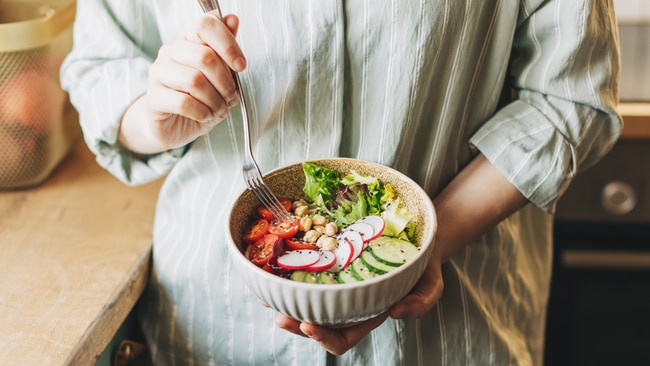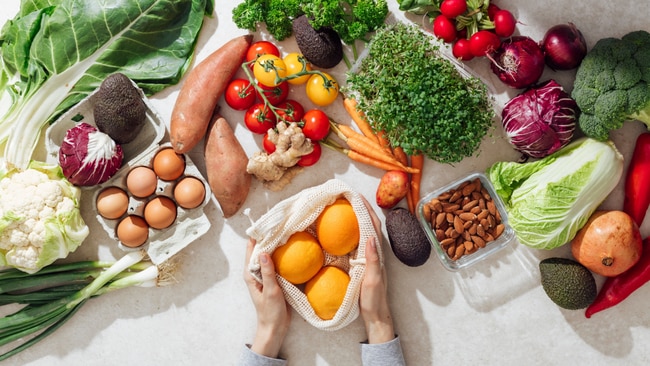5 best tips and tricks to beat menopausal weight gain
The foods to eat and the ones to avoid

Menopause
Don't miss out on the headlines from Menopause. Followed categories will be added to My News.
If you're going through menopause, chances are you're noticing several changes in your body. According to nutritionist Faye James, small dietary tweaks can make a big difference to how you look and feel during this time.
Menopause is a transitional phase that brings about several changes in a woman's body, including unwanted weight gain which can be hard to shift.
The combination of hormonal fluctuations, unhealthy eating habits, and reduced physical activity can contribute to this weight gain.
However, with some simple tweaks to your daily routine, you can effectively combat menopausal weight gain. Ahead, five research-backed tips to help you navigate this phase.
Like what you see? Sign up to our bodyandsoul.com.au newsletter for more stories like this.
Eat enough protein
Consuming adequate protein is crucial for older women experiencing menopause, as it helps combat muscle loss.
Aim for 1-1.2 grams of protein per kilogram of body weight each day, which translates to 20-30 grams of protein per meal. Excellent protein sources include Greek-style yoghurt (200g), a salmon fillet, or beans (200g) on two slices of wholegrain toast.
Watch your carbs
Monitoring your carbohydrate intake is important during menopause. A diet rich in refined or processed carbs, such as white pasta and bread, can contribute to excess belly fat.
Research published in the British Journal of Nutrition suggests that a reduced-carbohydrate diet may help decrease the risk of weight gain during menopause.

Keep track of calories
Keeping track of your calorie intake is essential during this time. As your metabolism slows down during menopause, you burn fewer calories each day, making it easier to consume more than your body needs. Be mindful of portion sizes when eating out or ordering takeout.
Research shows that eating three balanced meals a day, starting with a hearty breakfast containing lean protein and ending with a light dinner can be beneficial for weight management.
Aim to consume between 1000 to 1800 calories a day, depending on your height, weight, and activity levels. It's important not to restrict calorie intake to less than 500 calories a day as it can lead to muscle loss.
Try intermittent fasting
Intermittent fasting can be an effective weight loss strategy during menopause. This approach involves eating during an eight to 12-hour window each day and fasting for the rest of the time.
It is recommended for weight management at any age, but particularly during menopause. Consider ending your eating period by 7pm and resuming it at 7am the following day. However, consult with your doctor before starting intermittent fasting to ensure it is safe for your health.
Incorporate more fruits and vegetables
According to a study published in the journal Menopause, post-menopausal women who consumed diets rich in fruits and vegetables experienced fewer menopausal symptoms compared to those who consumed more fatty foods and sweets.
Reducing your intake of processed foods and increasing your consumption of fruits and vegetables can alleviate discomfort and promote overall health during this phase.

Foods to avoid during menopause
Processed foods
Steer clear of potato chips, cookies, and other processed snacks that are loaded with sodium and added sugars. These can make you feel bloated and cause water retention. Opt for healthier snacks like carrots with hummus or seeded crackers with peanut butter.
Spicy foods
While spices add flavour, foods high on the heat scale can trigger hot flashes, sweating, and flushing. Choose milder spices like basil, cumin, coriander, and turmeric, which add flavour without heat.
Fast food
Although convenient, fast food is often high in unhealthy fats that increase the risk of heart disease, a condition women are already more susceptible to after menopause. Opt for healthier options like a grilled chicken sandwich on a whole-grain bun, or prepare quick and nutritious meals.
Alcohol
Limit alcohol consumption to one drink or less per day. Excessive drinking increases the risk of breast cancer and cardiovascular disease, and alcohol can also trigger hot flashes in some women.

Caffeine
Cut back on caffeine if you experience worsened menopause symptoms. Research conducted by Mayo Clinic suggests that menopausal women who consume caffeine are more likely to have hot flashes. Switch to caffeine-free drinks like hot ginger or peppermint tea, or take a brisk walk for a natural energy boost.
Fatty meats
Reduce your intake of saturated fat found in fatty meats like brisket and bacon. High levels of saturated fat can lower serotonin levels, leading to feelings of anger, grumpiness, and irritability. Opt for leaner cuts of meat such as chicken, turkey, or 90 per cent lean ground beef.
Faye James is an accredited nutritionist, a member of the Nutrition Council of Australia, an associate member of the Australian Menopause Society and the author of The Menopause Diet, The 10:10 Diet and The Long Life Plan. You can follow her on Instagram here.
Originally published as 5 best tips and tricks to beat menopausal weight gain



